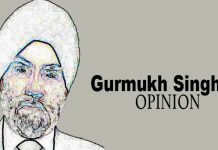
By Gurnam Singh | Opinion |
Within the Sikh worldview, the human capacity for reason and discernment, often described through terms such as bibek buddhi (discriminating intellect), is regarded as a sacred gift to humanity from the Divine. This faculty is not merely about the ability to think logically, but also the capacity to distinguish truth from falsehood, the real from the illusory, and the eternal from the transient. In the Guru Granth Sahib, human birth is portrayed as a rare and precious opportunity, for it brings with it the unique potential to seek union with the Creator through conscious reflection, moral action and spiritual awareness. This gift of reasoning is not presented as a self-sufficient end, but as a tool for self-realisation and righteous living, enabling the human being to navigate the complexities of the world while remaining oriented towards the Divine truth (Sat).
Though the emphasis may vary, the general view of the uniqueness of the human species to reason and reflect is universal and cuts across religious and secular tradition. Indeed, the capacity to exercise moral agency, which lies at the heart of all religious belief systems, would be impossible without the belief in our capacity to think, reason and make informed choices. Indeed, it is through this property that, unlike other species, humans possess the ability to question not only how the world works, but also why it exists and what moral responsibilities arise from that understanding.
SEE ALSO: Logic and Sikhi – Part 1
Sikh thought integrates this critical reasoning capacity with spiritual humility, warning against intellectual pride (haumai) that detaches reason from compassion. Reason, in this view, is to be exercised in harmony with Gurmat, or the Guru’s wisdom, so that human intelligence becomes a servant of higher truth rather than an instrument of ego or exploitation. In this way, the Sikh tradition affirms that our reasoning ability is both a sign of our kinship with all creation and a reminder of our distinctive moral and spiritual calling.
It is often asserted that Sikhi is a scientific belief system. Though there are clear resonances when it comes to reasoning and critical enquiry, given science is only concerned with what can be determined empirically, the truths that each tradition is seeking to uncover are quite different. Science and reason, in themselves, are not repositories of truth. They possess no intrinsic knowledge, nor do they claim infallibility. Rather, scientific reasoning is a disciplined method; a way of thinking whose central purpose is to expose ignorance and replace it with understanding. Ignorance, in all its forms, has been humanity’s oldest companion, shadowing us through every stage of our history.
There is broad consensus amongst evolutionary scientists that, unlike any other known life form on Earth, human beings have developed intricate systems of thought, religions, mythologies, philosophies, to explain the world around them. From the earliest awe-filled gaze at a falling star to the mapping of celestial orbits, from cataloguing the diversity of marine life to unlocking the secrets of atomic structure, our species has been defined by its insatiable curiosity. The very name Homo sapiens, “thinking being”, is itself a testament to this defining trait.
Yet, understanding the world and our place within it is no easy task. Indeed, it may well be impossible to arrive at final, absolute answers. The role of science, therefore, is not to deliver eternal certainties but to strip away error, dismantle illusions and refine our understanding. Across centuries and civilisations, from the ancient Nile and Indus valleys to the indigenous cultures of the Americas, Africa and Australasia, human societies have engaged in systematic observation, experimentation and knowledge-sharing. What the modern West calls the “scientific revolution” is, in truth, only one chapter in a much longer and more diverse human story.
SCIENCE MYSTIFIED
One of the tragedies of our age, not unlike many religious belief systems, is that science has become mystified, commodified and exploited for ulterior motives. Too often, it is seen as the exclusive domain of elite laboratories, multinational conglomerates and prestigious universities. This creates an artificial hierarchy of knowledge as if truth were the sole preserve of institutions with status and power. This separation of what some term ‘authored knowledge’ produced through scientific experimentation and peer review and the wisdom generated through the ‘natural’ experimentation of farmers, healers, artisans, navigators, hunters, and gatherers over hundreds of years, is rendered as mere tradition.
The evolutionary psychologist Steven Pinker argues in Rationality: What It Is, Why It Seems Scarce, Why It Matters (2021), rationality is not the monopoly of modern or technologically advanced societies. It is a universal human capacity, an essential tool for survival. Pinker notes that hunter-gatherer communities, for instance, routinely employ sophisticated reasoning in their daily lives. The suggestion that pre-modern or indigenous peoples were somehow “less rational” is not only inaccurate but a distortion of history.
However, our inherent capacity to reason does not guarantee that we use it wisely. Common sense tells us that humans often behave irrationally. Pinker explains this phenomenon as the misuse of our cognitive tools and a failure to apply the right kind of reasoning in the right context. Another factor is the human tendency to become lazy and succumb to cognitive biases. Just as there is good science, there is also bad science, that is knowledge production distorted by ego, greed, power, or ideology. The same scientific methods that have eradicated diseases, prolonged lifespans, and connected the globe have also created weapons of mass destruction, systems of surveillance, and now artificial intelligence with the potential to reshape the very conditions of life on Earth.
SCIENCE AT MORAL CROSSROADS
Here, science stands at a moral crossroads. For all its power, science cannot tell us what ought to be done; it can only reveal what can be done. The question of why we choose one path over another belongs to the realms of ethics, philosophy, and, at its highest, a spirituality rooted in compassion and humility. In this piece I have argued that science and reason are divine gift, which from a secular viewpoint might be termed gifts of nature. Yet, experience would suggest, along with these capabilities, humans have also been ‘gifted’ (or perhaps cursed!) with stupidity and ego, which probably explains why, despite possessing a supercomputer known as the human brain, humans are responsible for so much death and destruction.
The irony of our times is that, just as science has been commodified, so too has spirituality. Science risks being reduced to a mere instrument for profit and domination, while spirituality is marketed as a quick-fix lifestyle product, promising instant enlightenment without the rigours of moral responsibility. If science is nature’s gift, enabling us to understand the world, then wisdom is the compass that guides how we use it. Without such a compass, even the most brilliant discoveries can become instruments of destruction.
The challenge before us is not simply to advance scientific knowledge but to ensure that it is grounded in a vision of human flourishing, one that transcends greed, prejudice, and short-term gain. The question confronting humanity today is stark: can we align our unmatched capacity for scientific reasoning with an equally deep commitment to ethical responsibility? Or will we, intoxicated by our own cleverness, create the conditions for our own undoing? The answer will determine not only the fate of our species but also the future of the fragile planet we call home.

Gurnam Singh is an academic activist dedicated to human rights, liberty, equality, social and environmental justice. He is an Associate Professor of Sociology at University of Warwick, UK. He can be contacted at Gurnam.singh.1@warwick.ac.uk
* This is the opinion of the writer and does not necessarily represent the views of Asia Samachar.
RELATED STORY:
The Demise of the Akali Dal and the Badal Dynasty: What Next for the Panth? (Asia Samachar, 5 Aug 2024)
ASIA SAMACHAR is an online newspaper for Sikhs / Punjabis in Southeast Asia and beyond. You can leave your comments at our website, Facebook, Twitter, and Instagram. We will delete comments we deem offensive or potentially libelous. You can reach us via WhatsApp +6017-335-1399 or email: asia.samachar@gmail.com. For obituary announcements, click here































